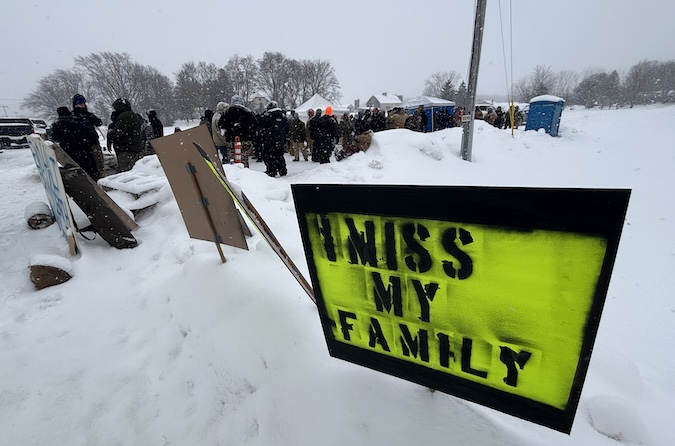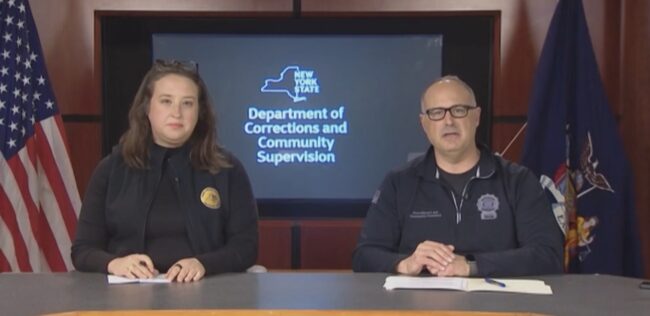Striking COs end public demonstrations in Albion
DOCCS sets today as deadline for staff to return to work and have health insurance reinstated and not face disciplinary action

Photo by Tom Rivers: Corrections officers on strike are shown Feb. 19 on Gaines Basin Road in Albion across the road from the Orleans Correctional Facility. Officers said they were working too much mandatory overtime, keeping them away from their families.
ALBION – Correction officers are not outside in a demonstration today across from the Orleans Correctional Facility.
They had been out there on Gaines Basin Road since Feb. 18, typically with about 100 current or retired officers gathered near burn barrels.
The state Department of Corrections and Community Supervision on Thursday evening announced it wouldn’t take disciplinary action against striking corrections officers if they returned to work today. DOCCS would also immediately reinstate their health insurance if they were back to work today.
Daniel Martuscello, the DOCCS commissioner, also vowed to create a committee focused on safety dealing directly with effects of the HALT Act. Corrections officers said the HALT Act was their primary motivation in going on strike. COs wanted it rescinded, saying that legislation, dealing with solitary confinement, had made prisons less safe for staff and inmates.
The commissioner also said DOCCS would continue a 2.5 overtime rate for 30 days from day employees return to work. Each prison will allow staff to transition from 12 to 8 hour shifts once normal operations return, and that will be determined facility by facility, Martuscello said. DOCCS will move away from 24-hour shifts, he said, to restore a life-work balance, he said.
DOCCS also will work with contractors to better screen mail to keep out contraband to better protect staff and the incarcerated population.
“I’m here to say that I heard my workforce,” Martuscello said in an on-line news conference. “I want to support them and continue to support them and continue to work on the safety issues that they’ve raised while out on the line. I want to end this illegal strike. We need to get back to some form of normalcy. and this delivers the things that they’ve asked for. I am determined to make sure that I deliver for them. They deserve it. We’ve heard them. We need them. They play an important role in public safety.”
The National Guard will remain in “a support posture” and will draw down their presence as staff return to prisons, he said.

Jackie Bray (left), commissioner of the state Division of Homeland Security and Emergency Services, and Department of Corrections and Community Supervision Commissioner Daniel Martuscello speak during an online news conference on Thursday.
Commissioner Bray said corrections officers and sergeants need to return today and won’t get another offer to return without discipline.
The state is prepared to remedy all of its rights, criminal and civil, to end the “illegal” strike, Bray said.
“We want you back, we need you back,” Bray said.
Those who have been terminated due to the strike will have their termination notices rescinded if they show up today at work, she said.
Some of the local corrections officers have returned to work, others have resigned and some are remaining on strike but are just staying home rather than being outside, a retired sergeant from Orleans Correctional told the Orleans Hub.
“Sadly it appears that this was all for naught,” the retired sergeant said about the strike that stretched 2 ½ weeks so far.
DOCCS appealed to corrections officers directly yesterday after the union declined to signa memorandum of understanding with terms to end the strike. The New York State Correctional Officers & Police Benevolent Association represents about 13,000 corrections officers.
“NYSCOPBA was not appropriately engaged in the development of the currently circulating agreement,” union spokesman James Miller said in a statement Thursday. “This agreement was not negotiated with NYSCOPBA—the legally recognized entity through which all negotiations must be conducted. There are substantial legal issues that must be addressed, and as presented, this agreement does not represent the best interests of our membership.”





































































